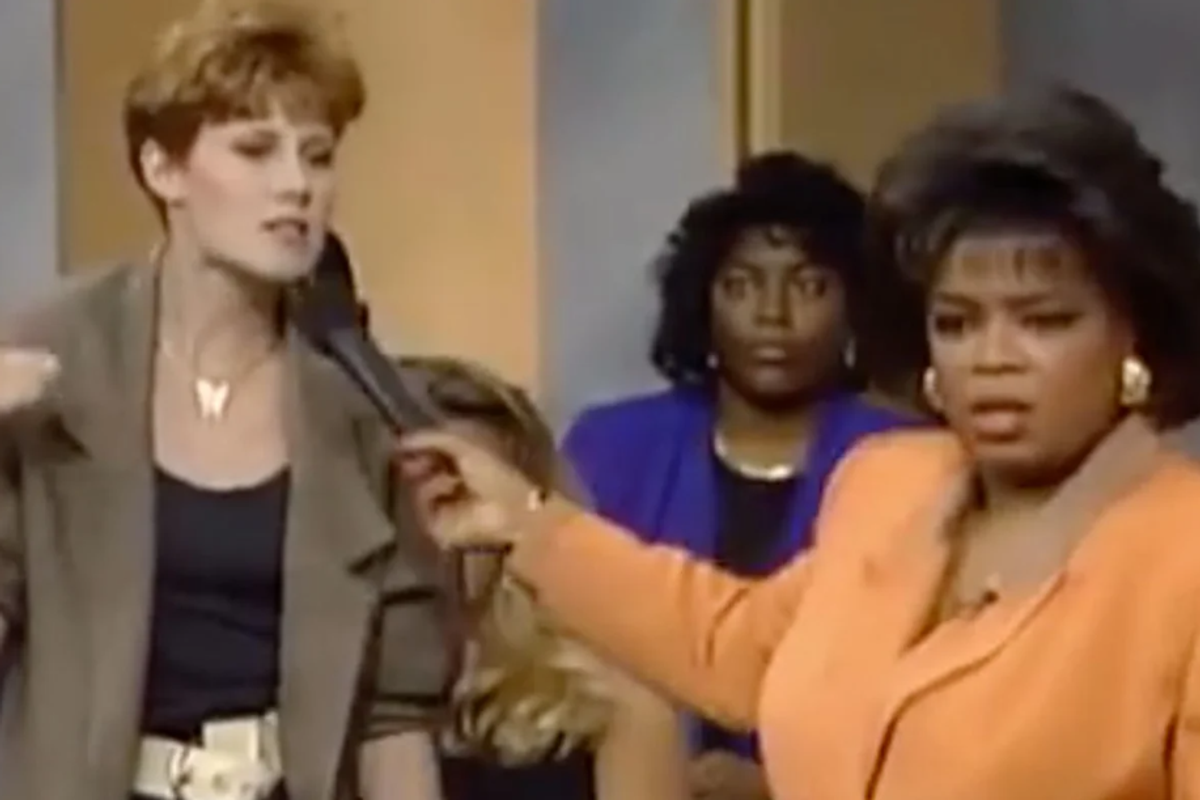Oprah's controversial 1992 secret racism experiment on her audience is still matters today
People turned on each other quickly.
A woman gets angry on an episode of "The Oprah Winfrey Show."
On an old episode of "The Oprah Winfrey Show" in July 1992, Oprah put her audience through a social experiment that puts racism in a new light. Despite being over three decades old, it's as relevant today as ever. She split the audience members into two groups based on their eye color. Those with brown eyes were given preferential treatment by getting to cut the line and offered refreshments while they waited to be seated. Those with blue eyes were made to put on a green collar and wait in a crowd for two hours.
Staff were instructed to be extra polite to brown-eyed people and to discriminate against blue-eyed people. Her guest for that day's show was diversity expert Jane Elliott, who helped set up the experiment and played along, explaining that brown-eyed people were smarter than blue-eyed people.
Elliott is an internationally known teacher, lecturer, and diversity trainer who, in 1968, after the assignation of Martin Luther King, Jr., performed the controversial and startling "Blue Eyes/Brown Eyes Exercise" in her third-grade classroom.
What is the Brown Eyes/Blue Eyes Exercise?
Watch the video to see how this experiment plays out.
oprah, racism, oprah wingrey, blue eyed/brown eye, jane elliott, oprah controversywww.youtube.com
One of the most interesting parts of the video is when, even though the blue- and brown-eyed people were segregated by Oprah's staff, they became angry with one another. One woman with brown eyes began to chastise the blue-eyed people, remembering the blue-eyed friend she had in the past. "I had a girlfriend in school who was blue-eyed," the brown-eyed audience member said. "She was so stupid. She was always copying off of my papers. These people were so rude and so noisy today. We couldn't hear any ourselves, not even talk; it was ridiculous."
From the stage, Eliott, pretending to be a brown-eyed supremacist, sternly talked about how brown-eyed people were superior but were called out for having blue eyes. She defended her position by saying she's learned to act like a brown-eyed person. "I've learned to act brown-eyed. I have a brownie husband and three brown-eyed children," Eliott told the audience. "Why did you get the message in this room is? It's to act brown-eyed, and you, too, can take off your collar. Act intelligently, and you, too, won't need your collar. None of you have acted intelligently yet."
Eventually, the audience realized that the experiment was about race, and Eliott stopped the brown-eyed supremacist posturing and began explaining how this experiment plays out in everyday America, but it's about skin, not eye color. That didn't stop one of the audience members from trotting out an old racist trope. "We can see where this is going. She's saying that everybody has racism in them. It's not really about the eye. She's trying to teach about racism," the male audience member said. "But she can't get away from the fact that God created the races, and you are going to be different. You can't help it."
Elliott had the perfect retort to the man who claimed that racism was divinely internet: "God created one race, the human race, and human beings created racism."
Watch the entire segment here:
- YouTubewww.youtube.com
This article originally appeared six years ago.

